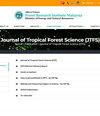低俗小说:国家利益、地区政治和印度尼西亚工业树木种植园的集聚
IF 0.8
4区 农林科学
Q4 FORESTRY
引用次数: 0
摘要
在过去的三十年里,印尼的工业纸浆和造纸种植园大幅扩张。本文分析了人工林是如何建立的,并随着时间的推移而变化,重点是所有者对大片林地的控制方式。该研究以两家大公司为中心,这两家公司控制着廖内省95%的种植园,廖内省是印度尼西亚最大的工业树木种植园。当前的分析框架将国家和地方利益与官僚政治理论结合起来。我们发现,少数私人参与者控制的大规模林地是通过满足国家发展目标并由国家森林官僚机构执行而成为可能的。在这种情况下,少数与中央权力机构关系密切的企业集团获得了追求林业目标的授权。我们的发现解释了地方官僚机构中出现的次国家模式,这些官僚机构的利益增长与大型种植园聚集土地以供应大型加工厂的短缺是一致的。国家和地方各级官僚机构之间的正式和非正式利益机制丰富了我们目前对林地收购的理解,这通常被简单地解释为一个痴迷于全球商品所带来的经济机会的中央集权国家本文章由计算机程序翻译,如有差异,请以英文原文为准。
PULP FICTION: NATIONAL INTEREST, REGIONAL POLITICS, AND THE AGGLOMERATION OF INDUSTRIAL TREE PLANTATIONS IN INDONESIA
Industrial pulp and paper plantations have expanded substantially in Indonesia over the past three decades. This paper analyses how plantations were established and changed over time, focusing on the ways owners have asserted control over massive forestland areas. The study centres on two major companies which control 95% of plantations in Riau, a province with the largest industrial tree plantations in Indonesia. The current analytical framework combines national and subnational interests alongside theories of bureaucratic politics. We found that large-scale forestland controlled by a few private players was made possible through meeting national development targets and carried out by the national forest bureaucracy. Under this constellation, a few conglomerates closely tied to central power holders secured mandates to pursue forestry goals. Our findings explain emergent subnational patterns among local bureaucracies, whose growing interests coincide with large-scale plantations agglomerating land to supply shortfalls in mega-processing plants. The mechanisms of formal and informal interests at play among bureaucracies at both national and sub-national levels enrich our current understanding about forestland acquisitions, which is often simplistically interpreted as a centralised state obsessed with economic opportunities presented by a global commodity
求助全文
通过发布文献求助,成功后即可免费获取论文全文。
去求助
来源期刊
CiteScore
1.70
自引率
22.20%
发文量
61
审稿时长
3 months
期刊介绍:
The Journal of Tropical Forest Science (JTFS) is an international reviewed journal concerning the science, technology and development of tropical forests and forest products. The journal welcomes articles reporting original fundamental or applied research on tropical forest biology, ecology, chemistry, management, silviculture, conservation, utilization and product development. English is the official language of the journal. Only manuscripts with substantial scientific merit will be reviewed for originality, significance, relevance and quality.

 求助内容:
求助内容: 应助结果提醒方式:
应助结果提醒方式:


